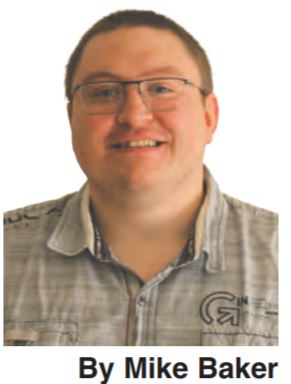Every year when I get a new calendar, one of the first things I do is go to Nov. 11 and use my red pen to designate it as a working day. No matter what.
There are few events more important, in my mind, to cover than the annual Remembrance Day services. I’ve done one every year since 2013 – first out in Bonnyville, Alberta; then a handful in Orangeville; and, for the past two years, the offerings here in Haliburton County. This year, I’ll be attending the service in Minden.
I always look forward to it. The services, especially here in Haliburton, are a spectacle. There’s typically 50 or so people who march from the Legion on Mountain Street down to the Cenotaph on Highland Street. Both roads are closed to traffic, and hundreds line the streets to pay their respects.
In many ways, I feel these services are more important than ever. We’re now more than 100 years removed from the end of the First World War. It’s been 78 years since the Allied forces declared victory in the Second World War. The number of people still alive, who can remember what times were like then, the impacts and long-term consequences of war, are dwindling.
In short, we rely on Remembrance Day services as the primary source to keep the memory of those who sacrificed so much in the name of peace and freedom alive. We owe everything we have and hold dear today to those who served.
I’m feeling it a bit this year, as this is the first time I haven’t been able to sit down and speak with a Second World War veteran. The handful of stories I’ve put together over the past decade are some of the most memorable and treasured pieces I’ve ever done.
In 2015, I had the pleasure of attending a ceremony honouring William McGregor, an at-the-time 92-year-old WWII veteran who served as a medic on the beaches of Normandy during the D-Day landings. He was surprised when, at the service, he was presented with the Knight in the Legion of Honour – the highest national order of France – for his efforts during the war.
I remember sitting down with him afterwards as he recounted some of the memories he’d done his best to suppress in the years since. Knowing what these people went through – many of them still kids at the time – always sends a shiver down my spine.
In 2017 I met Sir Fred Heber, a member of the 12th Field Royal Canadian Artillery Regiment. He was there on D-Day, storming Juno Beach with his brothers in arms. He was stoic as he recalled seeing countless friends cut down by German gunners, while he continued to push forward. He spent more than a year fighting in mainland Europe and was actually in German territory when the war was won Sept. 2, 1945.
In 2021, I met with Harold Rowden at the Haliburton Legion. Serving with the 3rd Division of the 13th Field Regiment, Rowden was a dispatch rider tasked with collecting messages from one checkpoint and delivering them to another. He survived the horror of Juno Beach and later was commended for saving a commanding officer’s life, after his unit had been shelled near Courseulles-sur-Mer in France. He was eventually discharged after being severely injured in the Battle for Caen.
Last year, I shared Cec Bailey’s story. A truck driver, charged with delivering weapons and ammunition to the front lines, Bailey also participated in the D-Day landings. Like every other veteran I’ve interviewed, Bailey didn’t enjoy talking about the war, and wouldn’t accept any credit for his efforts.
“I’m no hero, I just did what I had to do. What was right,” Bailey said.
Please, this Saturday, take a moment to remember. Without people like Cec, Harold, Fred, and William, we wouldn’t have the lives we have today.




